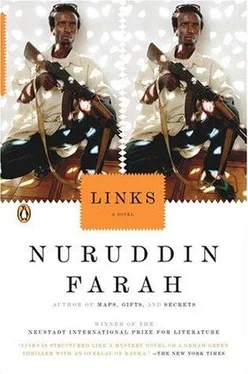Jeebleh didn’t know what to make of Caloosha’s behavior, and he got to his feet, unsure where to go or what to say. He paced back and forth, then placed his foot on a stool. They had both gone too far, and it was his turn to compromise, if necessary, to make amends. He put on his professional act: “In the pressure cooker of a civil war, in which the sides at war have been intimates, everyone exaggerates. Okay? And when a society has lost its general sense of direction and, along with it, its self-respect, then every individual is on his or her own, miserably alone. Like ants with no hierarchy or order. Okay? I suggest we forget whatever either of us has said in anger. Okay?”
“I get your point!” Caloosha replied.
They were silent for a long while, and a semblance of calmness returned. Caloosha was where Jeebleh wanted him to be, in an amiable mood. “I am here to make peace,” Jeebleh said. “Okay? The past is not here, the present is war, so we must think about the future and marry it to peace. You get me?”
“I get you.”
Jeebleh hoped that it wasn’t too late in the day for him to introduce the subject that had brought him to Caloosha in the first place. He thought cautiously and elaborated the question in his head. Then he straightened his back, massaged it, and yawned. “Have you seen Faahiye lately?” he said.
Jeebleh talked about Faahiye when he actually wanted to talk about Raasta, and her disappearance. Because the girl’s father was as safe a topic as he could come up with at short notice.
“He came to see me the other day, to say hi.”
“Alone?”
“Af-Laawe brought him along.”
“When was this?” Jeebleh asked.
“I can’t recall.”
“What about my mother’s housekeeper?”
“What about her?”
“Could you tell me how I can reach her? I’ll do so without imposing on you.”
“It is possible,” Caloosha said, “that like Faahiye, your mother’s housekeeper went to a refugee camp in Mombasa. I’ll see what I can do, and get back to you when I have news of them.”
How convenient: a refugee camp in Mombasa!
“What about Raasta and Makka?”
Caloosha gave the question serious thought before responding. “Faahiye assured me, when I asked him, that he knew nothing about his daughter’s whereabouts. You know that the girl’s parents had separated before her disappearance?”
“I would like to see Faahiye.”
“If he is in the country, you will,” Caloosha vowed.
“And my late mother’s housekeeper?”
“If she hasn’t left for Mombasa, you will.”
They exchanged a few pleasantries, and Jeebleh helped himself to another cup of coffee, and then asked if Kaahin could take him back to his hotel, on foot. And of course, he would think about the offer to move in with Caloosha, thank you most kindly.
BACK IN HIS HOTEL, JEEBLEH ARRANGED TO PHONE BILE. WHEN THEY spoke, they agreed to meet, and Bile promised to send Dajaal to fetch him. Jeebleh was eager to talk, because Af-Laawe’s and Caloosha’s innuendos were beginning to bother him.
As he waited for Dajaal, Jeebleh replayed in his mind the two encounters — with Af-Laawe his first day, and Caloosha today — and his expression clouded over as he sadly contemplated how difficult it might be to discredit the accusations. Even though he did not think there was any truth to their insinuations, he did not want to dismiss them out of hand. It was possible that they were trying to trick him away from the direction in which he ought to be moving. And what better way to achieve their devious ends than to introduce such hard-to-challenge charges against Bile’s integrity? Jeebleh didn’t wish to rely only on his gut feeling: he wanted to hear his friend’s side of the story too.
There was much ground to be covered. But before getting to what interested him, or asking Bile to refute the allegations or own up to them, Jeebleh decided that he would inform him about his own activities so far. He would tell him about being shadowed and then approached by the military types who had escorted him to Caloosha’s villa, and how the place had crawled with suspicious movements, how he felt the armed men were out to intimidate him and make him stop asking questions about Raasta.
Once Jeebleh and Bile were together, they were anxious to get talking before Bile was called away on some emergency or another. They spoke fast, their words now merging and working well together, now jarring and making no sense at all.
It fell to Jeebleh to make coffee for himself and tea for Bile, and to serve them both. It fell to him too to ask the appropriate questions so that his friend might build a bridge between his elusive past and the murky present in which they found themselves now.
“What was your first day of freedom like?”
“I had a harrowing experience of it,” Bile responded readily, prepared for this question, “because fighting framed my life then in ways I’ll never be able to communicate well to others not familiar with the circumstances.” The stress on his face was evident. “My first day as a free man proved to be the most frightening day in my entire life.”
“Why?”
“As prisoners, we were entirely cut off. We had no idea what was happening outside our cells. We had no idea that the Tyrant had fled the city. Someone, Lord knows who, opened the prison gates, someone else the gates of the city’s madhouses, someone else the gates of the zoo. So you had humans, some mad and some not, you had animals of every shape, size, and description, all of them on the run. And running alongside them, or in the opposite direction away from them, you had the looters, and the frightened families fleeing. You had thousands of political detainees, and hardened criminals in the tens of thousands. The lions, the zebras, the hyenas, the zoo camel with its two humps — every single creature on the run. You couldn’t tell who was fleeing from whom and who was chasing whom. Left to myself, I would’ve stayed on in my prison quarters, where I might have felt safer.”
“How did you know the gates were open?”
“Several hours after they were opened, a handful of vigilantes burst into our wing of the jail,” Bile replied, “and went from cell to cell, vowing to kill all the prominent politicians from the opposite clan family. The vigilantes had a dust-laden accent — they must have been recruited from the nomadic hamlets north of Balcad town. I was threatened with death because I tried to intervene, using the nationalist rhetoric of the sixties and seventies. They told me to leave, but I couldn’t, because I had a problem getting up. But they didn’t hack me to pieces with a machete. In the end, I left my cell, my home for so many of my prison years, when it was safer to do so.”
Jeebleh poured more tea into Bile’s cup. And looking outside, he saw the sky wearing the clearest of blue and the sun a very bright smile.
Bile continued: “The streets were filled to bursting with the mad, the political detainees just released, the criminals with all kinds of murderous records, and the animals from the zoo. The hard-hearted military types were busy looting the banks and city coffers. The clan militias recruited from the nomadic encampments were looking for city women to rape, and for properties to plunder and cart away in the trucks they had appropriated. The city, the whole country, was pure chaos. The advancing morning melted into high noon before I knew it. I was told of hungry hyenas scavenging in the city center, of lions on the prowl in school dormitories, and of elephants running amok in supermarkets! An unannounced eclipse at dawn: that was what it felt like, the first morning of my freedom.”
A heart-wrenching noise erupted outside. They both looked up. Bile explained that vultures were making this ungodly din on the roof of a nearby building, fighting over a carcass.
Читать дальше












